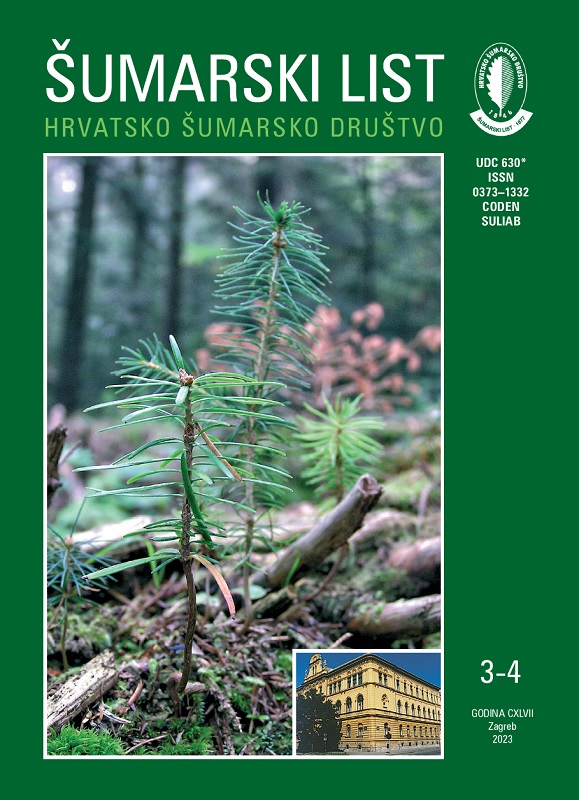
broj: 3-4/2023
pdf (11,3 MB) |
|
||||||||||||||
| RIJEČ UREDNIŠTVA | ||
| Uredništvo | ||
| On the occasion of March 21st, International Day Of Forests pdf HR EN | 105 | |
| Editorial In 2012, the United Nations General Assembly proclaimed the 21st of March as the International Day of Forests to raise awareness of the importance of all types of forests for the benefit of humankind and the environment. By establishing the International Day of Forests, the UN encourages all countries to undertake efforts to organise different local, national and international forest-related activities, involving the protection and preservation of forests, with special emphasis on tree planting campaigns. This year, the International Day of Forests in Croatia was marked by various activities, such as the appropriate planting of forest trees, an expert panel dedicated to innovations and sustainable development in forestry, as well as numerous articles on forests. It is evident that forests are gaining in importance not only as a natural resource but also as a source of other values. Forests and forest land (along with potable water, the sea and agricultural land) are the most important natural resource of the Republic of Croatia. They ensure favourable living conditions: pure air, clean and fertile soil, clean water and beneficial climate. Forests are a treasury of biological diversity. They are the only renewable source of wood matter. This year’s theme of the International Day of Forests was Forests and Health, or Healthy Forests for Healthy People. The health function of forests stems from the long-known beneficial effect of forests on the physical and mental health of people. Forests provide areas for recreation, recovery and rest. They have a beneficial effect on people’s health by purifying air and water, protecting against noise and creating beautiful environment. It is not surprising, therefore, that people rushed to the forests during the Covid-19 pandemic. However, the provision of health and other functions of forests depends on the optimal condition of forests, which results from adequate forest management. Management should be implemented in every forest, regardless of its purpose or owner. Silvicultural treatments in forests should ensure their optimal development and prevent forest risks. By doing so, forests will be equipped with powerful defence mechanisms and will be prepared for forest risks. Should forest damage occur, it should be rectified as soon as possible, and forests should be regenerated and tended in order to be healthy, vital, productive and capable of natural regeneration. Forest health has been recognized as one of the leading challenges of Croatian forests and forestry of recent times. Since 2013, large complexes of Croatian forests have repeatedly been exposed to extraordinary and intensive biotic, abiotic and anthropogenic stress factors, such as the rapid spread of pests and plant diseases, ice breaks, wind breaks and forest fires. Their increasingly frequent occurrence and high intensities are associated with climate change. Forests, forestry and the society as a whole suffer extensive ecological and economic damage. In the continental part of Croatia, intensive damage has been recorded in forests of narrow-leaved ash, pedunculate oak, common beech, silver fir and Norway spruce. In the Mediterranean area, forest fires threaten forests of Aleppo pine, black pine, holm oak and pubescent oak. This is why the role of forests and forestry in creating and preserving favourable living conditions for humans and the entire biological diversity has never been as important as it is at present times. Forests and forestry can significantly contribute to mitigating climate change. Only by responsible management of forests, by prioritising the tending, regeneration and protection of forests, and by not viewing forests only as a source of raw wood or a passively protected object of nature can we preserve our forests and all their values. Editorial Bord | ||
| IZVORNI ZNANSTVENI ČLANCI | ||
| Aydn Kahriman, Abdurrahman Şahin, Turan Sönmez, Mehmet Yavuz | UDK 630* 622+228 (001) https://doi.org/10.31298/sl.147.3-4.1 | |
| Growth models for natural stands of Calabrian pine in the central Mediterranean region of Türkiye pdf HR EN | 107 | |
| Sercan Gulci, Neşe Gulci, Dalia Abbas, Hasan Serin, Kvanç Yuksel | UDK 630* 831+360 (001) https://doi.org./10.31298/sl.147.3-4.2 | |
| Evaluating the carbon monoxide mission from chainsaw exhaust outlet pdf HR EN | 121 | |
| Bilal Çetin | UDK 630* 630+232.3 (001) https://doi.org/10.31298/sl.147.3-4.3 | |
| The effect of altitude and closed cone (seed) age on germination in red pine (Pinus brutia Ten.) pdf HR EN | 129 | |
| PREGLEDNI ČLANCI | ||
| Igor Poljak, Katarina Tumpa, Antonio Vidaković, Mirna Ćurković-Perica, Marin Ježić, Zlatko Šatović, Zlatko Liber, Marilena Idžojtić | UDK 630*+630+165+907 https://doi.org/10.31298/sl.147.3-4.4 | |
| Conservation and management of sweet chestnut genetic resources pdf HR EN | 137 | |
| Jasnica Medak, Ivana Sirovica, Joso Vukelić | UDK 630*228+332+653 https://doi.org/10.31298/sl.147.3-4.5 | |
| Forest clearing typology pdf HR EN | 147 | |
| Ana Šujica, Martina Obradović, Mia Lovreković, Veronika Šušnjara, Dominik Paparić, Željko Španjol, Boris Dorbić | UDK 630* 652 https://doi.org/10.31298/sl.147.3-4.6 | |
| Valorization of significant trees in Šibenik-Knin County pdf HR EN | 155 | |


